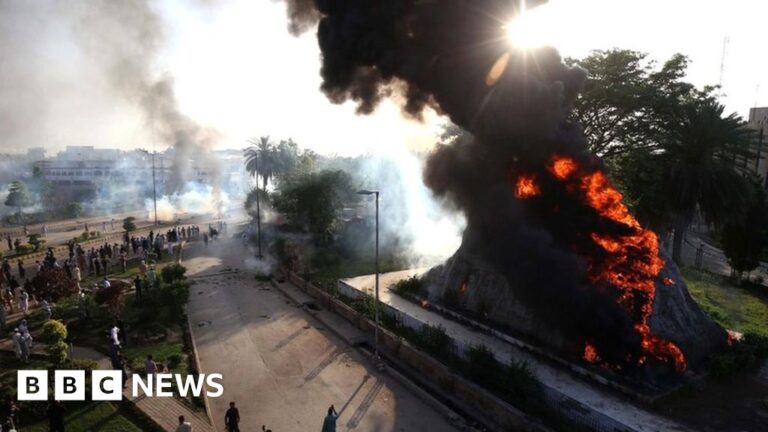- By Simon Fraser and Caroline Davies
- in London and Islamabad
Watch the dramatic arrest of Pakistan’s former prime minister
Violent clashes broke out in Pakistan between security forces and supporters of former prime minister Imran Khan after his arrest on Tuesday.
Protests erupted across the country, and at least one person was killed in the city of Quetta.
The United States and the UK have called for adherence to the “rule of law”.
Mr Khan was arrested by security forces at the High Court in the capital, Islamabad.
Dramatic footage showed dozens of paramilitary members arriving and detaining the 70-year-old, who was bundled into a car and driven away.
He is facing court for corruption charges, which he says are politically motivated.
Mobile data services in the country were suspended on the instructions of the interior ministry on Friday as protests grew, many of them taking place in front of army compounds.
Pakistan’s army plays a prominent role in politics, sometimes seizing power in military coups, and, at other times, pulling the levers behind the scenes.
Speaking from Washington, US Secretary of State Antony Blinken said he wanted to ensure that “whatever happens in Pakistan is in accordance with the rule of law, with the constitution”.
Foreign Secretary James Cleverly, speaking alongside Blinken, said Britain enjoyed a “long and close relationship” with Commonwealth member Pakistan, and wanted to “see the rule of law followed”.
On Tuesday night, supporters of Imran Khan gathered outside the Pakistan High Commission in London to protest against his arrest.
Mr Khan was ousted as PM in April last year and has been campaigning for early elections ever since.
General elections are scheduled to be held later this year.
Speaking on the BBC’s Newshour, Mr Khan’s spokesman, Raoof Hasan, said he expected “the worst” and that the arrest could plunge the country “into chaos and anarchy”.
“We’re facing multiple crises. There is an economic crisis, there is a political crisis, there is a cost of livelihood crisis and consequently this occasion will be a catharsis for them to step out and I fear a fair amount of violence is going . to get back,” he said.
A member of Mr Khan’s legal team, Raja Mateen, said disproportionate force was used against him.
“Mr Khan went to the biometric office for biometrics. The rangers went there, they broke the windows, they hit Mr Khan on the head with a baton,” Mr Mateen said.
Mr Khan’s Pakistan Tehreek-e-Insaf (PTI) party called on its supporters to protest. In the hours after his arrest, violence was reported from cities including Lahore, Karachi and Peshawar.
On the streets of Islamabad, hundreds of protesters blocked one of the main highways in and out of the capital.
People tore down street signs and parts of overpasses, lit fires and threw stones. During the hour the BBC was there, there were no police or authorities in sight.
Protesters blocked roads in protest in Karachi, Pakistan’s largest city
The protesters said they were angered by the arrest of Imran Khan.
“This is really the last straw,” said Farida Roedad.
“Have anarchy, have chaos. Without Imran, there will be nothing left in Pakistan. Nobody will take over.”
It said at least 10 people, including six police officers, were injured in the southwestern city of Quetta in clashes between Mr Khan’s supporters and security forces – with one protester also killed.
A water cannon was deployed by police against protesters in Lahore
A statement from the inspector general of the Punjab police said Mr Khan’s arrest was ordered because he was accused of “corruption and embezzlement”.
The case involves allegations of land allocation to the so-called Al-Qadir Trust, owned by Mr Khan and his wife, Dawn newspaper reported.
Mr Khan, who is being held at an undisclosed location, has denied breaking any laws.
In a video message filmed while he was traveling in Islamabad – and released by PTI before his arrest – Mr Khan said he was ready for what lay ahead.
“Come to me with warrants, my lawyers are there,” he said. “If you want to send me to jail, I’m ready for it.”
Imran Khan has been the main opposition leader since his opponents ousted him from parliament a year ago
Security was tight in the center of the capital for the former PM’s court appearance.
Dozens of cases have been filed against Mr Khan since he was ousted from power.
Security forces tried to stop him on several previous occasions at his residence in Lahore, but were thwarted by his supporters, resulting in heavy clashes.
On Tuesday, the police blocked the roads leading to Islamabad, so the number of supporters of Imran Khan was not as high as on previous occasions, making his arrest easier.
He was elected prime minister in 2018, but fell out with Pakistan’s powerful army. After a series of defections, he lost his majority in parliament. He was ousted after he lost a vote of confidence in April 2022, four years into his tenure.
Protesters in Peshawar set fire to the premises of Radio Pakistan in protest against the arrest of former Prime Minister Imran Khan
Since then, he has been a vocal critic of the country’s government and army.
In October, he was disqualified from holding public office, accused of falsely declaring details of gifts from foreign dignitaries and proceeds from their alleged sale.
The following month, he survived a gun attack on his convoy while conducting a protest march.
On Monday, the military warned him against making “baseless allegations” after he again accused a senior officer of plotting to kill him.
